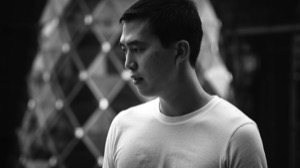
Director of Thailand’s gay-themed entry for the 2016 Academy Awards Best Foreign Language Film How to Win at Checkers (Every Time)
Thailand’s official entry for ‘Best Foreign Language Film’ for the 2016 Academy Awards is a gay-themed parable titled How To Win At Checkers (Every Time). Though it was released last spring here in the states, it did not make the final cut; four other pictures which are also gay-themed did not make the cut either. But it still reflects well on Thailand’s reputation as the most gay-friendly nation in Asia to have even nominated it and a huge feather in the cap of Texas-based director Josh Kim. It is based on a series of short stories, two actually, from Rattawut Lapcharoensap’s critically-acclaimed collection, Sightseeing. Released in April 2005, it’s a dark and, according to Kim, cautionary tale about Thai corruption that makes our system of government appear positively Utopian.
But it is also an exuberant celebration of childhood as told through the child’s-eye fish lens of the 10-year-old narrator, Oat (a remarkable Ingkarat Damrongsakkul). He, and his brother Ek (played with substantial nuance by Thira Chutikul) are orphaned early, living in squalor outside the Bangkok city limits with their auntie and cousin Kwan. When Oat turns 21, he must go before a mandatory military draft, and while conflict with their southeastern neighbor Malaysia is intensifying, a conflict is set up between Ek’s fortunes and that of his boyfriend Jai. Jai comes from the moneyed class and is easily able to bribe his way out of his predicament with a local official. Ek? His fortunes are, sadly, also tied to money.
Oat tells his story in substantially brighter tones, told largely through and over a motorcycle that Ek will one day bequeath him. (Kudos to cinematographer Nikorn Sripongwarakul!) For Oat, it represents an emotional connection to Ek, whom he idolizes. It also represents a simpler time when the thrill of being in the driver’s seat with your big brother guiding you through the countryside on a motorcycle takes on legendary proportions.
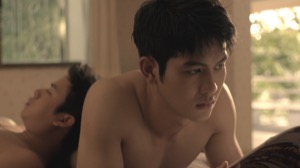
Josh Kim spent three years in Thailand to make this picture. He spent time, he tells me, in the homes of the dancers and sex workers who Ek commiserates with fictitiously on film. It is a labor of love and San Diego LGBT Weekly is thrilled that Josh agreed to answer a few of our questions about the film and the directorial process that contributed to its positive reviews.
San Diego LGBT Weekly: Why did you decide to revisit Oat’s 10th year of boyhood to tell the story?
Josh Kim: Well, technically we counted backwards, since he is recounting the story when all males in Thailand are called to the draft (21 years old). But we also felt this age was a pivotal time in our lives where one begins to come of age. I remember watching other coming of age films like Stand By Me and wanted to create a similar emotion.
You tell your story from an unpleasant moral universe where the good guys pick the ‘red’ chips in the military lottery but you can live at the top of the City if you are willing to lie and cheat to get there. I’m guessing that’s the reality for a lot of Thais?
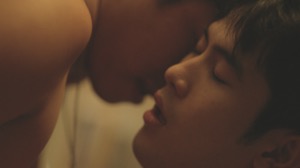
Well, it’s also part cautionary tale. We wanted to look at the cost of success. Even though he grows up to be quite successful, he is still haunted by these nightmares (of his brother’s face on fire). This sort of represents the guilt he feels for all the bad decisions and desperate things he’s learned to do in his life.
It’s a very personal film. Are you in it? If so, in what ways?
Yeah, I would say if I had to choose one character, it would be the young Oat. I also have an older brother who is nine years older than I am and I remember asking him where he would go at night and if I could tag along. Unfortunately, or fortunately, he never did let me tag along, and maybe that was for the better, for the things I never saw (and shouldn’t have seen) at such a young age. He was also the inspiration for the title as he was the one who taught me how to play chess and I remember quite keenly the day I beat him.
There’s a lot of child-like exuberance to the picture?
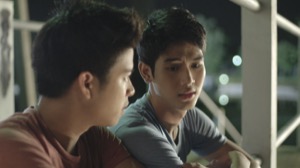
I guess since it’s from the point of view of the kid, maybe it comes from that. Also, I’d say Thais just have a really great sense of humor. Even while we were translating and writing the film in Thai, a lot of small lines got turned into jokes and the atmosphere on set was quite light and friendly. It was really a fun shoot.
When did the motorcycle, and all that warmth that goes with it, Oat and Ek, become a central device in the way you told your story?
In the original short story, At the Cafe Lovely, the motorcycle was quite prominent so we wanted to keep that as a [main] line of the film. It was something that was handed down from his father, to his brother then it became his. But in the end, he decides to sell it because he doesn’t want to follow the same fate as his father and his brother.
What are some of the reasons you agreed to do this picture?
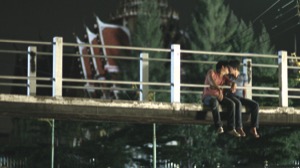
I felt the characters in the original book of short stories were quite compelling. Even though the stories were set in another country, I felt that the characters were people I knew, my brother, my neighbors, my friends, etc. Rattawut, the author, wrote the stories in such a visual way that it felt like I had just watched a movie. It was almost as if I had licked the colors off a film strip. Also, a lot of the themes like inequality and class were themes that also resonated with me. It was something I was willing to spend three years of my life to turn into a reality.
Do you have a daily rhythm to the way you direct on the set?
I think it changed as the shoot progressed. I might have been over-prepared in the beginning. Toward the end I loosened up and would look less at my shot list and would improvise more with the director of photography and actors each time we went to the locations.
Which directors influence you and in what ways?

Years ago, I remember watching the films of Thomas Bezucha – Big Eden (2000) and The Family Stone (2005) – and realizing how films could be vehicles for change. In Big Eden, a gay artist from New York City returns to his conservative hometown in the Midwest and instead of encountering prejudice and discrimination as one might expect, he is surprised to find neighbors and elderly women trying to set him up with other gay friends. It was the first time I saw how creating a world (which was unlikely at that time and place) could show viewers a world which could be possible. And I wanted to do that with this film as well.
Is directing what you started out in life wanting to do?
I didn’t even know about directing until in my early twenties. My family didn’t’ really go out together and watch movies. I think the only ones I watched in theaters with my parents were Bambi and Jurassic Park. It wasn’t until I started watching films in college that I started to get interested. And then when I was 24 I went back to school in Hong Kong to study film. But I dropped out after three months. I felt that it was something I had to learn by doing instead of reading from a book.











